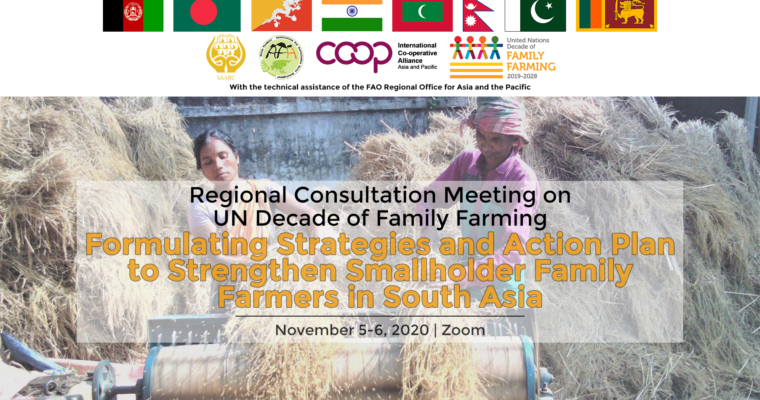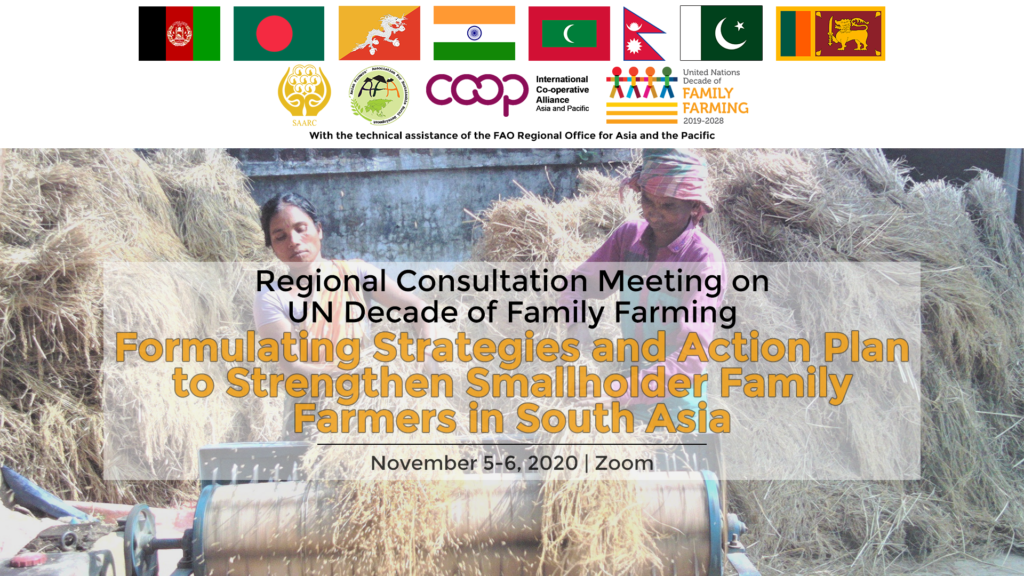REGISTER HERE
Introduction
South Asian Association for Regional Cooperation (SAARC) comprising eight countries (Afghanistan, Bangladesh, Bhutan, India, Maldives, Nepal, Pakistan, and Sri Lanka) where 65% of the population residing in rural areas. A large majority of the rural population are smallholder family farmers adopting integrated farming system consisting of agriculture, forestry, fisheries, pastoral and aquaculture production, which is managed and operated by a family and predominantly reliant on family labour, both women’s and men’s (FAO and IFAD, 2019), and they are more efficient in production (Shrestha et al., 2016). The families and the farms are linked, coevolve, and combine economic, environmental, reproductive, social, and cultural functions. Family farmers in South Asia produce at least 70% of the foods in the region with women putting in as much as 80% in farm work, through an agricultural practice and system that integrates crops, fisheries, livestock, trees, non-timber products, fruits, and nuts, among others. However, family farmers are handicapped with access to natural, financial, technological, and market resources, including inputs, extension services, credit, and markets for their products. As a result, farmers in the region remain to be the highest rate of poverty, hunger, and undernourishment.
To highlight the role of family farmers in sustainable development and strengthen their empowerment, the United Nations declared the “United Nations Decade of Family Farming (UNDFF) for 2019-2028” (FAO & IFAD, 2019). The UNDFF envisioned statement “a world where diverse, healthy and sustainable food and agricultural systems flourish, where resilient rural and urban communities enjoy a high quality of life in dignity, equity, free from hunger and poverty.” In order to achieve this vision, the UNDFF Global Action Plan identifies 7 Pillars (Annex I) towards improving family farming and achieving the targets of Sustainable Development Goals (SDGs) by 2030 in the world (FAO & IFAD, (2019). Indeed, the declaration emphasized that until and unless strengthening the smallholder family farmers’ socio-economic conditions, the overall prosperity of the country wouldn’t be flourished. The declaration along with the Global Action Plan needs to customize with regards to the existing situation, challenges, opportunities, natural phenomena of the respective countries and the region.
In this milieu, incorporating the issues and the UNDFF declaration/ Global Action Plan, SAC in collaboration with Asian Farmers’ Association for Sustainable Rural Development (AFA) and International Cooperative Alliance Asia and Pacific (ICA-AP), with technical support from Food and Agriculture Organization Regional Office for Asia and the Pacific (FAO RAP), Thailand, is going to organize a virtual consultation meeting to formulate a “Regional Action Plan of UN Decade of Family Farming in South Asia region”.
Objectives
The main objective of this regional consultation meeting is to formulate a Regional Action Plan that defines the key priorities, strategies, and actions to implement the UN Decade of Family Farming to strengthen family farmers in South Asia and improve their wellbeing in the next 10 years.
The specific objectives are to:
- Appreciate the Global Action Plan of UNDFF and analyze it with respect to South Asia regional and national contexts.
- Take stock of the current situation of family farming in South Asia, including key challenges, constraints, and policy issues as well as ongoing initiatives which promote the UNDFF in the region
- Formulate a South Asia regional strategy and action plan for UN Decade of Family Farming coherent with the global action plan of the UNDFF.
PROGRAM
Time Zone: Bangladesh Standard Time (GMT+6)
DAY 1: NOVEMBER 5, 2020
| TIME | ACTIVITY |
| 10.30 – 10.40 | Preliminaries |
| 10.40-11.10
6 speakers*5 minutes
|
Session 1: Opening Program Moderator: Dr. Rudra B. Shrestha, SAC§ Welcome remarks – Dr. Mian Sayeed Hassan, Director, SAC1.1 Keynote Speeches: § Special Guest: Nigel Brett, Director, Asia Pacific Region (Representative of the President), IFAD Rome, Italy. (Recorded) § Special Guest: Mr. Sridhar Dharmapuri, FAO RAP, Thailand (Live) § Special Guest: Ms. Esther Penunia, AFA Secretary General (Live) § Special Guest: Mr. Balasubramanian Iyer, ICA Asia-Pacific Director (Live) § Chief Guest: Dr. Abdur Rouf , Additional Secretary, Ministry of Agriculture, Government of Bangladesh (Live) |
| 11.10 – 12.00
8 countries *6 minutes each |
1.2 High-level Segment
Promoting Family Farming to Achieve the SDGs and Advance Resiliency Amidst COVID19 and Climate Change Ministers/ Secretaries will talk about their actions to promote Family Farming through the UNDFF and the kind of engagement they want to pursue with Family Farming organizations § Dr. Shaikh Mohammad Bokhtiar, Executive Chairman at Bangladesh Agricultural Research Council (BARC) |
| 12.00 – 12.10 | Objectives and Flow of the Workshop Dr. Rudra B. Shrestha, SAC |
| 12:10 – 12:30 | Video by Food and Agriculture Organization on Family Farmers: The future of Asia and the Pacific |
| 12.30 – 13.30 | Lunch Break |
| 13.30 – 14.30 3 speakers* 10 minutes each |
Session 2: The Global Action Plan of the UNDFF Discussions include the role of UNDFF in advancing welfare of family farmers, IFAD’s role in mobilizing and supporting stakeholders to achieve UNDFF goals and objectives, and the status of the implementation of the Global Action PlanModerator: Esther Penunia, AFA§ Global Action Plan Framework and FAO’s National Level Support: Marcela Villarreal, PSUD Director, FAO HQ (tbc) § IFAD’s Support to Global Action Plan and its Localization: Ron Hartman, UNDFF Focal Person, IFAD HQ (tbc) § Achievements and Status at the Global, Regional and National Levels: Laura Lorenzo, Executive Director, World Rural Forum Open forum and synthesis (30 minutes) |
| 14.30 – 15.30
8 countries * 6minutes each |
Session 3: Family Farming Country Status Report and UNDFF National Action Plan Process Session 3 presents specific country family farming situation and localization of UNDFF.Moderator: Dr. Mian Sayeed Hassan, Director SAC§ Afghanistan: Mr. Mahboobullah Nang, Director of Seed Certification, Ministry of Agriculture, Irrigation and Livestock § Bangladesh: Dr. Md. Harunur Rashid, Director, National Agricultural Technology Project (NATP Phase-Il) and Chief Scientific Officers (CroPs)’, Bangladesh Agricultural Research Council, Dhaka § Bhutan: Mr. Wangda Dukpa, Chief Agriculture Officer, Department of Agriculture, Ministry of Agriculture & Forests § India: Dr. S. Bhaskar, Assistant Director General (AAF & CC), ICAR-Krishi Anusandhan Bhawan, New Delhi § Maldives: Mr. Ibrahim Shabau, Director General, Ministry of Fisheries, Marine Resources and Agriculture § Nepal: Dr. Hari Bahadur KC, Joint Secretary, Ministry of Agriculture and Livestock Development § Pakistan: Dr. Muhammad Asim, Principle Scientific Officer, Plant Science Division, PARC § Sri Lanka: Mr. I.M.N. Chandrasiri, Principal Agriculturist (Training), Department of Agriculture Open Forum (12 minutes) |
| 15.30-15.50 | Short Break |
| 15.50-16.20
3 speakers*5mins each
|
Session 4: Farmers Organizations’ Initiatives to Promote the UNDFF
In this session, FO representatives will discuss their strategies, lessons and recommendations. Moderator: Mohit Dave, ICA-AP § Nepal: Meena Pokhrel, Deputy General Manager, Nepal Agricultural Cooperative Central Federation, Ltd (NACCFL) for National Committee on Family Farming Nepal § India: Megha Desai, Senior Program Coordinator, Self Employed Women’s Association (SEWA) for National Committee on Family Farming India § Sri Lanka: Mr. Upali Herath, Consultant, National Cooperative Council of Sri Lanka Open Forum and Synthesis (15 minutes) |
| 16.20 – 16.45
4 speakers*6 minutes |
Session 5: Technical Session
5.1 Pillars 1-4: Key Challenges and Key Priorities at National and Regional Levels Moderator: Pierre Ferrand, FAORAP Plenary presentations Pillar 1 – Dr. Rudra B. Shrestha, SAC Pillar 2 – Mohit Dave, ICA-AP Pillar 3 – Irish Baguilat, AFA Pillar 4 – Esther Penunia, AFA |
| 16.45 – 17.30 | Break out groups: 4 groups (45 minutes)
Moderators: Pillar leads Rapporteurs: Participant Documenters: FAO HQ |
Time Zone: Bangladesh Standard Time (GMT+6)
DAY 2: NOVEMBER 6, 2020
| TIME | ACTIVITY |
|
10.30 -11.00 |
Moderator: Pierre Ferrand, FAORAP
Reporting of breakout group outputs (4 groups, 5 minutes each) – Assigned rapporteurs Open forum (10 minutes) |
| 11.00-11.20 3 speakers*6 minutes each |
5.2 Pillars 5-7: Key Challenges and Key Priorities at National and Regional Levels
Moderator: Pierre Ferrand, FAORAP
Pillar 5 – Dr. Devendra Gauchan Pillar 6 – Dr. Monirul Alam Pillar 7 – Dr. Hum Nath Bhandari |
| 11.20 -12.00
|
Break out groups: 3 groups (40 minutes)
Moderators: Pillar leads Rapporteurs: Participant Documenters: ICA-AP |
| 12.00 -13.00 | Lunch break |
| 13.00 – 13.30 | Plenary reporting (3 groups * 5 minutes each = 15 minutes) – Assigned rapporteurs
Open forum and synthesis (15 minutes) |
| 13.30 – 14.00 | Videos from SAC, AFA and ICA-AP |
| 14.00 – 15.15 | Session 6: Adopting the Draft Joint Communique
Moderator: Irish Baguilat, AFA Presentation of the First Draft of the Joint Communique / Outline of Regional Plan for UNDFF in South Asia Open Forum |
| 15.15 – 15.45 | Short Break (Finalize Joint Communique) |
| 15.45 – 16.15
2 mins each |
Session 7: Closing Program (Reading/ Commitment of Joint Communique and Ways Forward)
Moderator: Dr. Rudra B. Shrestha, SAC Participants’ Endorsement of the Joint Communique and Regional Action Plan for UNDFF in South Asia § Government representatives (8) § NCC Sri Lanka § Maria Stella Tirol, ComDev Asia Regional Facilitator, UPLB College of Development Communication § NGO representative § Krishok Moitree/Central Farmers Alliance (KKM) |
| 16.15-17.00 | Closing Remarks (5 mins per speaker)
§ Sonam Yolmo, Sonam Yolmo, Vice Chairperson, AFA Regional Young Farmers Committee § Rasha Omar, Head of Delhi Hub, IFAD § Pierre Ferrand, FAO Regional Office for Asia and the Pacific, Thailand § Balasubramanian Iyer, ICA Asia-Pacific Director Vote of Thanks § Dr. Mian Sayeed Hassan, Executive Director, SAC |





Comments are closed